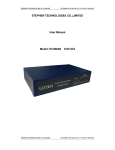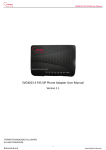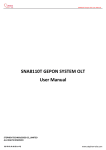Download SVX8004 IP PBX System User manual - stephen
Transcript
SVX8004 IP PBX System User Guide SVX8004 IP PBX YSTEM User Guide 陈泽科技有限公司 -1- www.stephen-tele.com SVX8004 IP PBX System User Guide 1. Introduction 1.1. Overview SVX8004 IP PBX is an all-in-one converged communications solution ideal for small businesses. The product offers full PBX functionality, including VoiceMail, Auto Attendant, Hunt Group, Ring Group, Call Transfer, Call Forward and much more, which help businesses reduce communications costs and stay connected everywhere. SVX8004 IP PBX is a hybrid telephone system capable of handling both traditional telephone and Voice over IP calls. Using VoIP allows calls from one location to be routed over the Internet to another location, eliminating long distance charges. SVX8004 IP PBX can also directly integrate with VoIP service provider networks. SVX8000 is very easy to understand, configure, and deploy. The web interface is designed to provide a clean and user-friendly configuration window so that users won’t get lost in complicated menus and maintenance. A fully working system can be set up quickly and be ready to communicate. 1.2. Capacity The system has the following capacity: 4 Analog ports in the 3 possible configurations: 2 analog lines + 2 analog extensions 4 analog extensions 4 analog lines 4 VoIP lines 12 VoIP extensions 1.3. Features Full Range of PBX Features SVX8004 IP PBX offers a full range of traditional PBX features like Call ID, Call Forward, Call Transfer, Call Pickup, Call Waiting and 陈泽科技有限公司 -2- www.stephen-tele.com SVX8004 IP PBX System User Guide more. All such features are available to both analog and VoIP extensions. Auto Attendant SVX8004 IP PBX handles inbound calls with an auto attendant. Auto attendants answer all incoming calls, play a recorded message and route callers to their requested extensions. All voice prompts are fully customizable. Call Queue Call Queue holds incoming calls when all members are busy assisting other callers. Calls wait in the call queue for the next available member. While calls are waiting, callers hear music-on-hold. Calls are distributed out of the call queue on a first in, first out basis, as members become available. Voicemail The voice mail feature allows messages to be recorded when a particular extension can not be answered. It is also possible to send particular calls to a voice mail box directly. Voice mail messages are recorded in wav format and stored in the user’s mailbox and optionally forwarded by email to the user. Automatic Route Selection SVX8004 IP PBX gives you complete control over your phone lines and extensions. You can automatically place specific types of calls on specific lines. Line Hunt Group Line Hunt Group consists of analog or VoIP lines that are associated so that calls to any line in the group are rolled over to the next available line in the group when the line is busy. You can move lines within a line group to set the hunt order. Extension Ring Group Extension Ring Group is a collection of users, for example a group to handle all sales related calls. An incoming caller wishing to speak to sales can be directed to that group, where the call can be answered by any member of the group who is available. 1.4. Software specifications Protocol SIP RFC3261 SDP RFC2327 RTP/RTCP Codec G.711/G.729 Extension Analog Extension IP Extension Line PSTN Line FXO Gateway SIP Register SIP Trunk 陈泽科技有限公司 -3- www.stephen-tele.com SVX8004 IP PBX System User Guide Configuration WEB browser IVR Keypad Firmware Upgrade HTTP / FTP 1.5. Hardware specifications Network Interface 1 LAN, 10/100Mbps Auto-Negotiation RJ45 port Analog Interface 4 RJ11 analog ports in following 3 configurations 2FXO+ 2 FXS with power failure pass-through 4FXO 4FXS Power AC adapter Input: 100~240V AC, 50/60Hz Output: DC 12V/1A Environmental Conditions Operational temperature: 0~40 Storage temperature: -10 ~60 Humidity: 10~90%, no coagulation Dimensions Size: 178(W) x 130(D) x 35(H) mm : ℃ ℃ ℃ 2. Installation 2.1. Safety Precautions Before using SVX8004 IP PBX, please review and ensure the following safety instructions are adhered to: 1) Read, follow and retain instructions — All safety and operating instructions should be read, followed and retained for future reference before operating the equipment. 2) Heed warnings — All warnings on the equipment and in the operating instructions should be adhered to. 3) Temperature — Do not operate in environments where the temperature is below 0°C or 32°F. If the product was shipped in cold weather, please let the system warm up at room temperature for at least two hours before plugging it in to a power outlet. 4) Moisture — Do not place SVX8004 IP PBX in a high-humidity environment. 5) Heat — Never place SVX8004 IP PBX near heat sources such as radiators, floor registers or in direct sunlight. Do not stack units on top of each other. 6) Power supply — The equipment should only be connected to an approved power supply of the type described in the operating instructions or marked on the equipment. Use only the power adapter supplied with SVX8004 IP PBX. 7) Damage requiring service — Do not attempt to service the SVX8004 IP PBX yourself. Unplug SVX8004 IP PBX and refer servicing to a licensed technician when: The plug or power cord has been damaged. SVX8004 IP PBX has been exposed to moisture. 2.2. Check package contents Each SVX8004 IP PBX package should include the following: Name Quantity SVX8004 IP PBX unit 陈泽科技有限公司 1 -4- www.stephen-tele.com SVX8004 IP PBX System User Guide RJ-11 telephone cable 1 for each phone port RJ-45 Ethernet cable 1 AC adapter 1 Quick installation guide 1 2.3. Ensure you have the following One computer with Ethernet network interface One analog telephone 2.4. Front & Back Panel SVX8004 IP PBX Front & Back The front panel consists of eight lights: PWR Indicates the power status. The power is on when PWR light is lit. LAN Indicates the LAN port connection status, The LAN is connected correctly if the LAN light is lit. STS Indicates the system status. The light will flash for a few moments during boot-up, and then remain lit, indicating the device is on. Line Indicates the usage of the onboard lines. A Line is occupied if the indicator light is lit. Ext Indicates the usage of the onboard extensions. The light is lit when the extension is ringing or off-hook. 2.5. Back Panel SVX8004 IP PBX with 2 Extensions and 2 Lines 陈泽科技有限公司 -5- www.stephen-tele.com SVX8004 IP PBX System User Guide SVX8004 IP PBX with 4 Lines LAN Extension Line Power RESET The LAN connector is an RJ-45 port used for unit configuration via the PC, unit LAN networking, and VoIP capability. The “Extension” connectors are RJ-11 ports used for connecting phones and other analog devices. The “Line” connectors are RJ-11 ports used for connecting incoming telephone lines. The power connector is a receptacle rated at 12VAC/1.5A for connecting the supplied AC adapter input line, with a power switch beside. The reset button is used to reset all parameters to the factory default. NOTE: The SVX8004 IP PBX with 2 extensions and 2 lines supports power failure pass-through. In the event of a power failure or loss of power, the extension ports are able to receive and make calls through the line ports directly. 2.6. Connect the device 2.6.1. Connect diagram Typical scenario A: Connect with PSTN (Suitable for SVX8004 IP PBX with 2 extensions and 2 lines) 陈泽科技有限公司 -6- www.stephen-tele.com SVX8004 IP PBX System User Guide Typical scenario B: Connect with traditional PBX (Suitable for SVX8004 IP PBX with 4 lines) 2.6.2. Connect the power Plug the DC end of the power adapter to the power socket on the device and the other end to an available power outlet. Press the power switch ON at the back of the device to start the device. The PWR indicator light will be lit if power is connected correctly. WARNING! Never use a power adapter other than the one provided with SVX8004 IP PBX. 2.6.3. System Startup The STS light on the front panel will flash for a few moments during boot-up, and then remain lit, indicating the device is on. 2.6.4. Connect the network Connect the LAN port on the device to a Router/Switch by cable. The LAN indicator will lit if connected correctly. 2.6.5. Connect the computer Connect a computer to the same Switch or Router as SVX8004 IP PBX, so the SVX8004 IP PBX can be accessed through the network. 2.6.6. Connect the telephone Connect one end of the provided RJ-11 telephone cable to the Phone jack and the other end to your phone. You can hear some signal tone from the earpiece when you pick up the telephone handset. NOTE: 陈泽科技有限公司 -7- www.stephen-tele.com SVX8004 IP PBX System User Guide The signal tone cannot be heard from the handset before the booting process is completed. The STS light on the front panel will flash for a few moments during boot-up, and then remain lit, indicating the device is on. 2.6.7. Connect the PSTN line Connect one end of the RJ-11 telephone cable to wall phone jack of an incoming phone line and the other end to the Line jack at the back of the SVX8004 IP PBX. WARNING! Never connect the line to the Phone jack. Otherwise, the device may be damaged. 3. Configuration 3.1. Initial Configuration 3.1.1. Get the device IP address Pickup the phone connected on the Ext port, dial *100#, and then follow the voice instruction. Press “0” key to listen for the IP address of the device. NOTE: You may not hear the voice from the phone if the device is still in booting process. The STS light on the front panel will flash during boot-up, then remain lit, indicating the device is on. 3.1.2. Login into the Web interface Make sure your computer is in the same subnet with the device by modifying your computer’s IP address to match the device’s IP address. Start web browser, enter the IP address of the device into the address bar. The login page will appear: Enter the user name and password to login. The default user name is “admin”, and the password is “admin”. NOTE: 陈泽科技有限公司 -8- www.stephen-tele.com SVX8004 IP PBX System User Guide We strongly advice you to change your password when you first login to avoid any unnecessary loss. You can press and hold the “Reset” button on the back panel for a few seconds to reset to factory default if you have forgotten or lost the password. Be aware that all the parameters you set before will be lost if you do so. 3.1.3. Web interface overview After successful login, the desktop screen will appear. Online Help center - Click this icon to enter the online help center of SVX8004 IP PBX Application Manage - Add, remove or update the application or software. Control Panel - Change the password for the login account, modify system time and check the system information. Network Settings - Get the IP address and DNS server address of the system. Return to desktop - Click this button to return to the desktop at any time. IP-PBX Configuration - Click this icon to enter the IP-PBX configuration interface. Reboot - Reboot the device. Exit - Logout from the desktop System Time - Shows the current time of the system. 3.1.4. Network Settings This screen lets you configure the network connections. The grey color on the WAN icon shows that WAN interface is unavailable. Click the LAN icon, the LAN Settings screen will appear, you can change the IP address and DNS server address for the LAN port here. Device’s MAC address is showed in the Mac Address section. 陈泽科技有限公司 -9- www.stephen-tele.com SVX8004 IP PBX System User Guide 3.1.5. Control Panel This screen lets you change the password for the login account, modify system time and check the system information. To check system information: To change the login password: To set the system Time: There are two ways to set the system time: 陈泽科技有限公司 - 10 - www.stephen-tele.com SVX8004 IP PBX System User Guide Set as PC Time: Click this button. The device will synchronize time with your PC immediately. Through NTP Server: Tick the option “Auto Synchronize with Internet NTP Server”, The device will automatically synchronize time with the NTP server periodically. You should select the time zone where the device resides and input the address of the NTP server. The button “synchronize Now!” will let the device synchronize time with the server immediately. Edit system service parameters In the “System Services” section, you can edit the HTTPD service parameters Click the link “thttpd”. The following screen will appear. You can change the listen port and the login timeout of the HTTPD server. If there is no action performed after the timeout specified here, the Web screen will return to the login page. Diagnostic Enter a destination host’s IP address or domain name into the text area next to Ping button and click the Ping button, device will try to ping that address and print the returned message in screen. 陈泽科技有限公司 - 11 - www.stephen-tele.com SVX8004 IP PBX System User Guide 3.1.6. Application Manage This screen lets you add or remove application(s) and update the system software. To remove an application, just click the “Delete” button under the application name which you want to remove. A new application can be added to the system by installing from an installation package file. The whole system, including the embedded Linux operation system, can be updated by reprogramming the flash. Just select the appropriate binary file and click “Upgrade” to start. WARNING! 陈泽科技有限公司 - 12 - www.stephen-tele.com SVX8004 IP PBX System User Guide The updating process may take some time. Never power off the device during the updating, otherwise the device might be damaged permanently. 3.1.7. IP-PBX Configuration Interface Click the “ROXos-ippbx” icon on the desktop. The IP-PBX configuration interface will appear. In this interface, you can do all configurations related to the IP-PBX functions. In the IP-PBX configuration interface, if you want to return to desktop screen or logout, just click the link at the top right of the screen at any time. You can click the button “Reload ROXos” to restart the IP-PBX service without rebooting the device. NOTE: Only one CODEC type is supported by SVX8004 IP PBX at a time. If you want to change to other CODEC type, you should update the firmware to corresponding version. 3.2. Configure Extensions SVX8004 IP PBX supports up to 14 extensions including 2 onboard analog extensions and 12 IP extensions. 3.2.1. Configure Onboard Extensions Click the “Extensions” menu, and “Onboard Extension” submenu. The Onboard Extension table will appear. You can edit the parameters of each Ext port by selecting “Ext1” or “Ext2” 陈泽科技有限公司 - 13 - www.stephen-tele.com SVX8004 IP PBX System User Guide Number - The telephone numbers of the 2 onboard Ext ports are fixed to 101 and 102. The user can not change these. Display Name - A description name for memorization. When calling from this extension to another IP phone, the name will be displayed on the LCD screen of the phone as the caller name. Voicemail - Select “On” to activate the voicemail box for the extension or “Off” to deactivate it. NOTE: Parameters with a “*” mark are mandatory. A value must be specified before submitting. Parameters with a blue color are optional. The value can be specified or not. Click “OK” to submit or “Cancel” to abort the change. If any parameter is changed in the IP-PBX, three buttons will appear on the top of the screen. Click “Save & Reload” to save the changed parameter to flash and restart the IP-PBX service to make the changed parameter take effect immediately. Click “Save” to save the changed parameter only to flash. It will not take effect until the next restart. Click “Cancel” to abort all the parameter changes since the last saving. 3.2.2. Configure IP Extensions Click the “Extensions” menu, and “Add IP Extension” submenu. The Add IP Extension screen will appear. You can create an SIP account here. 陈泽科技有限公司 - 14 - www.stephen-tele.com SVX8004 IP PBX System User Guide Number - The telephone number of an IP extension, can be any number between 200 and 999. Secret - The password associated with the number which will be used by the IP extension to register to the IP-PBX. Display Name - A description name for memorization. When calling from this Extension to another IP phone, the name will be displayed on the LCD screen of the phone as the caller name. Voicemail - Select “On” to activate the voicemail box for the extension or “Off” to deactivate it. Click “OK” to submit and click “Save & Reload” to take immediate effect. After adding an IP extension, the created SIP account can be configured to an IP phone, ATA, voice gateway or any other SIP compliant device and then registered to SVX8004 IP PBX as IP extensions. 3.2.3. Extension Status Click the “Status” menu, and “Extension Status” submenu. The Extension Status table will appear. The status of all the added extensions is listed here, including the 2 onboard analog extensions. You can click the “Extension Status” submenu again to refresh the information. IP Address - The IP address from which the IP extension is registered to SVX8004 IP PBX. Port - The port associated with the IP address for registration. Status - Shows the calling state for onboard analog extensions and shows the registration state for IP extensions. Fwd. - Shows whether the call forwarding is activated or deactivated for the extension. C.W. - Shows whether the call waiting is activated or deactivated for the extension. 陈泽科技有限公司 - 15 - www.stephen-tele.com SVX8004 IP PBX System User Guide 3.2.4. Extension Manage Click the “Extensions” menu, and “Manage” submenu. The Extension Manage table will appear. All the added extensions are listed in this table. You can delete an IP extension by ticking the box corresponding to the number and clicking the “Delete” button on the top left of the table. Just click on the number to enter the “Edit Extension” screen if a parameter change is needed. 3.3. Configure PSTN Lines SVX8004 IP PBX has 2 onboard line ports which can be connected with 2 PSTN lines. The system can be extended to up to 6 PSTN lines via FXO Gateway if more PSTN lines needed. 3.3.1. Configure Onboard PSTN lines Click the “Lines” menu, and “Onboard Line” submenu. The Onboard Line table will appear. You can edit the parameters of each Line port by selecting “Line1” or “Line2”. Line ID - The Line ID is a read-only value. It is generated by the system automatically and is used to identify each line in the system. Line Group - Line Group consists of analog or VoIP lines that are associated so that calls to any line in the group are rolled over to the next available line in the group when the line is busy. The 2 onboard lines belong to the “Onboard_Line” group. External Number - The PSTN number of the PSTN line connected to the Line port. Call Direction - Only incoming calls are allowed on the line if “Incoming” is selected; only outgoing calls are allowed on the line if “Outgoing” is selected; both incoming and outgoing calls are allowed on the line if “Both” is selected. Incoming call route - Select the destination where the incoming call will be routed. Reject call - The call will be rejected immediately and the caller will hear a busy tone. Auto Attendant - The call will be answered by the auto attendant and the caller will hear a voice prompt. 陈泽科技有限公司 - 16 - www.stephen-tele.com SVX8004 IP PBX System User Guide Extension - The specified extension will ring immediately when the call comes in. Ring Group - The Ring Group will ring immediately when a call comes in. This option is grey if no ring group has been added yet. Voicemail Box for Extension - The call will be directed to the voicemail box of the specified extension and the caller will hear the greeting of the mailbox. Click “OK” to submit the changes, and then click “Save & Reload” to reload the system to take immediate effect. 3.3.2. Configure lines via VoIP Gateway Click the “Lines” menu, and “Add VoIP Gateway” submenu. The Add VoIP Gateway screen will appear. You can add a gateway line group and create SIP accounts for the VoIP gateway here. Name - A description name for memorization. The name will be automatically added by the system with the prefix “gw_” by the system to clearly indicate it is a gateway line group. Number of physical lines - Select the number of physical PSTN lines that the gateway supports and that you are using. NOTE: The total number of the lines is 4, including lines added via VoIP gateway, VoIP provider and VoIP trunk, excluding the 2 onboard lines. So the available number in the list of the “Number of physical lines” may change according to how many lines have been added and how many lines remain available to be added. Outbound Caller ID - An optional parameter which fills into the Caller ID field on an outgoing call. Click the “Next” button. Individual lines will be created and displayed in a columnar format. SIP accounts will be generated for each line with default Line ID, Authen ID and password. Only the password can be modified. 陈泽科技有限公司 - 17 - www.stephen-tele.com SVX8004 IP PBX System User Guide Line ID - The Line ID is the number which the gateway will use to register to the SVX8004 IP PBX. Authen ID - The authentication ID when registered to the SVX8004 IP PBX. Authen Password - The authentication password when registered to the SVX8004 IP PBX. Call Direction - Only incoming calls are allowed on the line if “Incoming” selected; only outgoing calls are allowed on the line if “Outgoing” is selected; both incoming and outgoing calls are allowed on the line if “Both” is selected. External Number - The PSTN number of the PSTN line connected to the Line port of the gateway. Click the “Finish” button. The system will bring up the line manage page which shows all the lines including the 2 onboard lines and the lines added via the gateway. Click the corresponding line ID to enter the line edit screen. You can modify the property of the line as described above. 陈泽科技有限公司 - 18 - www.stephen-tele.com SVX8004 IP PBX System User Guide 3.3.3. Configure the VoIP Gateway After adding the VoIP gateway line group and creating the SIP accounts for each line, you should configure the VoIP gateway to register its lines to the SVX8004 IP PBX system. Configure the VoIP registration Each line created for the VoIP gateway in the SVX8004 IP PBX System has to be configured in the VoIP gateway’s “SIP” or “VoIP” settings section. Each line has to be configured with a SIP account including Line ID (line number), Authentication ID and Authentication Password. These must match the values you entered in the corresponding fields of the lines you created in the SVX8004 IP PBX. Configure the Routing Once your gateway has been configured and its “SIP” or “VoIP” lines are registered with the SVX8004 IP PBX System server, the gateway must be configured to forward incoming calls from the PSTN to the line numbers(Line ID) of the PSTN lines created in the SVX8004 IP PBX. Many VoIP gateways can be configured to work with SVX8004 IP PBX. We recommend the following: CHIMA - SVG6000B CHIMA - SVG6116 Grandstream - GXW-4104 D-Link - DVG-3004S Micronet - SP 5050 Linksys - SPA3000 Tainet - Bodhicom 3404/3408 3.3.4. Line Status Click the “Status” menu, and “Line Status” submenu. The Line Status screen will appear. Here you can see whether each line of the gateway is registered or not. 陈泽科技有限公司 - 19 - www.stephen-tele.com SVX8004 IP PBX System User Guide 3.4. Configure VoIP lines 3.4.1. Configure VoIP Provider Click the“Lines” menu, and “Add VoIP Provider” submenu. The Add VoIP Provider screen will appear. You can add a VoIP provider line group and add the SIP accounts acquired from the VoIP provider. Name - A description name for memorization. The name will be automatically added by the system with the prefix “pv_” by the system to clearly indicate it is a provider line group. Server Address - The IP address or Domain name of the provider’s SIP server. Server Port - The SIP port on which the SIP server is operating. Default is 5060. Outbound Caller ID - An optional parameter which fills into the Caller ID field on outgoing calls. Number of VoIP lines - Select the number of VoIP lines supplied by the VoIP provider and that you are actually using. NOTE: The total number of the lines is 4, including lines added via VoIP gateway, VoIP provider and VoIP trunk, excluding the 2 onboard lines. So the available number in the list of the “Number of VoIP lines” may change according to how many lines have been added and how many lines remain available to be added. Click the “Next” button, Individual lines will be created and displayed in a columnar format. You should fill the SIP accounts information acquired from the provider into the fields of each line. 陈泽科技有限公司 - 20 - www.stephen-tele.com SVX8004 IP PBX System User Guide External Number - The VoIP number of the line. Authen ID - The authentication ID when registered to the VoIP provider. Authen Password - The authentication password when registered to the VoIP provider. Call Direction - Only incoming calls are allowed on the line if “Incoming” is selected; only outgoing calls are allowed on the line if “Outgoing” is selected; both incoming and outgoing calls are allowed on the line if “Both” is selected. Line ID - The Line ID is an internal number used by SVX8004 IP PBX to identify each line. Click the “Finish” button. The system will bring up the line manage page which shows all the lines including the 2 onboard lines and the lines added via gateway and provider. Click the corresponding line ID to enter into the line edit screen. You can modify the properties of the line as described on the previous page. 陈泽科技有限公司 - 21 - www.stephen-tele.com SVX8004 IP PBX System User Guide Click the “Status” menu, and “Line Status” submenu. The Line Status screen will appear. Here you can see whether each line of the VoIP provider is registered or not. 3.4.2. Configure VoIP Trunk VoIP Trunk, or SIP Trunk, is a connection between two SIP devices. Unlike the Client-Server relation between SIP client and SIP server, it is a peer to peer relation between two SIP devices which connects each other via SIP Trunk. An advantage of SIP Trunk is that the two devices can call each other directly at any time as long as their IP addresses are reachable to each other, with no registration needed between them, and no need to register to another SIP server in order to be able to call each other. SVX8004 IP PBX supports connecting with other SIP devices via SIP Trunk. These SIP devices can be other SVX80004 or other third party IP-PBX, analog gateway, digital gateway, soft switch, etc. Click the “Lines” menu, and “Add VoIP Trunk” submenu. The Add VoIP Trunk screen will appear. You can add trunk line(s) here. 陈泽科技有限公司 - 22 - www.stephen-tele.com SVX8004 IP PBX System User Guide Name - A description name for memorization. The name will be automatically added with the prefix “tk_” by the system to clearly indicate it is a VoIP trunk. Server Address - The IP address of the other SIP device Server Port - The SIP port number of the other SIP device. Number of VoIP lines - Select the number of VoIP lines which can be talking simultaneously in this trunk. NOTE: The total number of the lines is 4, including the lines added via VoIP gateway, VoIP provider and VoIP trunk, excluding the 2 onboard lines. So the available number in the list of the “Number of VoIP lines” may change according to how many lines have been added and how many lines remain available. Inbound Auth ID - The inbound authentication ID is used to authenticate incoming calls from the other SIP device to avoid unauthorized calling. If no value is specified here, no authentication is performed when a call comes in. Inbound Auth Password - The authentication password associated with the inbound authentication ID. Outbound Auth ID - The outbound authentication ID is used for outgoing calls to get the authorization by the other SIP device. This valued can be filled or not, depending on whether the other device requires authentication. Outbound Auth Password - The authentication password associated with the outbound authentication ID. Outbound Caller ID - When calling from this device to another device, the caller ID will be replaced with the value specified here. This is an optional parameter. If no value is specified here, the outgoing caller ID will be the name of the caller extension. Click the “OK” button. The system will bring up the VoIP Trunk manage page which shows all the trunks added. You can edit or delete the trunks here. 陈泽科技有限公司 - 23 - www.stephen-tele.com SVX8004 IP PBX System User Guide 3.5. Configure Outbound Rules An outbound rule defines on which line an outbound call should be placed. This allows you to create a set of rules which specifies how a call should be made based on which extension is making the call and what number it is calling. NOTE: No outbound call can be made before a valid outbound rule is added. Click the “Outbound Rules” menu, and “Add Outbound Rule” submenu. The Add Outbound Rule screen will appear. You can define an outbound rule here. Name - Assign a name to identify this outbound rule. Dial prefix - Apply this rule if the call starts with the number specified here. For example, specify 0044 (or 01144 in the US) to specify that all calls to the UK should be routed via a particular line or service provider. Strip Digit - Strip Digit specified that how many digit(s) will be removed from the first digit of the number that has been 'caught' by the outbound rule before it is routed to a selected line group. Prepend - You can add prefix to a number that has been 'caught' by the outbound rule before it is routed to a selected line group. 陈泽科技有限公司 - 24 - www.stephen-tele.com SVX8004 IP PBX System User Guide NOTE: 'Strip Digit' has higher priority then 'Prepend'. A caught number will be processed by 'Strip Digit' first before been processed by 'Prepend', for example, when 'Strip Digit' has value of '2' and 'Prepend' has value of '33', a caught number '123456' will be transformed to '333456' before it is route to a selected line group Calls from extension(s) - Select the extensions for which this rule applies. Outbound Route - Select the line group on which the calls will be made. Multiple line groups can be selected and the priority can be adjusted by clicking the up and down arrow icons. Click “OK” to submit the changes, and then click “Save & Reload” to reload the system to take immediate effect. Click the “Outbound Rules” menu then “Manage” submenu. The Outbound Rule Manage screen will appear. You can delete rule(s) by ticking the box corresponding to the rule name and clicking the “Delete” button on the top left of the table, or click the rule name to enter the “Edit Outbound Rule” screen if you want to modify the rule. 3.6. Advanced Configuration 3.6.1. Ring Group A ring group allows you to direct calls on a particular number to a group of extensions. For example, you could define a group of 3 sales people, and have the general sales number ring on all 3 extensions at the same time or after each other. When you create a ring group, you also assign it a virtual extension number. This will be the number used by the phone system to “address” the ring group. Click the “Advanced” menu, and “Ring group” submenu. The Ring Group Manage page will appear. 陈泽科技有限公司 - 25 - www.stephen-tele.com SVX8004 IP PBX System User Guide Click “Add Ring Group”. The “Add Ring Group” screen will appear: Number - Assign a 4 digit number to this ring group. The ring group can be called by this number from any extension or auto attendant. Name - A description name for memorization. Ring Strategy - Select the appropriate ring strategy for this ring group: Ring all - all the extensions in the group will ring at the same time when calls come in. Hunt - The first extension will ring, then the second, then the third etc. Ring Timeout - Specify how long the ring should ring for. Ring group members - Specify the extensions that belong to this ring group. Move the extensions up or down to adjust the priority. Destination if no answer - How to handle the call when no one in the group answers it. Click “OK” to submit the changes, and then click “Save & Reload” to reload the system to take immediate effect. 3.6.2. Auto Attendant The auto attendant feature allows SVX8004 IP PBX to answer incoming calls automatically and present the caller with a list of options. The caller can then choose the appropriate option using the numbers on his phone key pad or enter the extension number directly to be connected to an extension. 陈泽科技有限公司 - 26 - www.stephen-tele.com SVX8004 IP PBX System User Guide You can implement a menu: for example, for sales, press 1; for support, press 2, etc. Recording a menu prompt Before you create your auto attendant, you must write down the menu options you wish to offer the caller, think of a suitable text and record the announcement. A simple example would be “Welcome to Company XYZ; for sales, press 1; for support, press 2; to reach a receptionist, press 0; if you know your party’s extension number, you may enter it now”. NOTE: We recommend you put the number the user should press after the option, i.e. “for sales, press 1”, rather than “press 1 for sales”. This is because the user will wait for the desired option and only then “register” what number to press. Once you have devised the text you can record the prompt by dialing “*100” followed by “#” at any extension. Follow the voice instruction to record the welcome greeting. Configure the auto attendant Click the “Advanced” menu, and “Auto Attendant” submenu. The “Auto Attendant Settings” page will appear. Auto Attendant Number - This is the number for the auto attendant which can be called from any extension. The number is fixed to 77777 and cannot be changed. Action - Here you can specify the menu options. Select the appropriate actions for each key. The action for “0” key is default to Attendant Call Queue and cannot be changed. (For Attendant Call Queue information, please refer to the next section “Call Queue”) There are three actions for each key: No Action - No action will be taken. The system will send an error message to the user and ask for another input. Connect to Extension – The system will transfer the call to the specified extension. Connect to Ring Group – The system will transfer the call to the specified ring group. Click “OK” to submit the changes, and then click “Save & Reload” to reload the system to take immediate effect. 陈泽科技有限公司 - 27 - www.stephen-tele.com SVX8004 IP PBX System User Guide 3.6.3. Call Queue Call Queue holds incoming calls when all members are busy assisting other callers. Calls wait in the call queue for the next available member. While calls are waiting, they will hear the music-on-hold. Calls are distributed out of the call queue on a first in, first out basis, as members become available. Usually Call Queue is used for attendants who need to handle many incoming calls. SVX8004 IP PBX supports only one call queue for attendants and up to 6 calls can be waiting in the queue at the same time. Click the “Advanced” menu, and “Call Queue” submenu. The “Attendant Call Queue Settings” page will appear. The user can modify the call queue settings here. Attendant Call Queue members - Specify the extensions that should be part of this call queue. Move the extensions up or down to adjust the priority. Click “OK” to submit the changes, and then click “Save & Reload” to reload the system to take immediate effect. 3.6.4. Call Pickup You can accept an incoming call that is ringing at another extension which belongs to the same pickup group as your extension (For how to use call pickup, please refer to the section “Using the telephone”.) Click the “Advanced” menu, and “Call Pickup” submenu. The “Pickup group Manage” page will appear. 陈泽科技有限公司 - 28 - www.stephen-tele.com SVX8004 IP PBX System User Guide Click “Add Pickup Group“, The “Add Pickup Group” screen will appear. Pickup Group No - Select a number for this pickup group. Up to 4 pickup groups can be added. Name - A description name for memorization. Pickup Group Members - Select the extensions that should be members of this pickup group. Click “OK” to submit the changes, and then click “Save & Reload” to reload the system to take immediate effect. For how to use call pickup, please refer to the section “Using the telephone”. 3.7. General Configuration 3.7.1. Protocol Settings Click the “General” menu, and “Protocol Settings” submenu. The “Protocol Setting” page will appear. 陈泽科技有限公司 - 29 - www.stephen-tele.com SVX8004 IP PBX System User Guide SIP Port - Specify the SIP port on which the SVX8004 IP PBX is operating. Default is 5060. Line Registry Expires - Specify the expiration time for the line registration. Default is 360 seconds. DTMF Mode - Select the method used to send the DTMF signal. Three methods are supported: In-band, RFC2833 and SIP INFO. Default is RFC2833. Ext. Registry Expires (60-4800s) - Specify the extension registry expiration time. When this parameter has a value, all extensions will be forced to use this value as their registry expire time. When this parameter does not have a value and, the registry expire value of the registered extension is in the range of 60-4800 second. The extension can keep their own registry expire value. When this parameter does not have a value and, the registry expire value of the registered extension is out of the range of 60-4800 second. SVX8004 IP PBX will force the extension to use 60 as their expire value. RTP Start - Specify the start port for RTP protocol. Default is 10000. RTP End - Specify the end port for RTP protocol. Default is 11000. External Addr. (If behind NAT) - Specify the external public IP address or domain address if the SVX8004 IP PBX is behind NAT. Domain Refresh (When using external domain) - Specify the period for the domain refresh. The SVX8004 IP PBX needs know the actual external IP address of the domain name if domain name is used in the “External Addr.” section, so, the device will periodically sent the refresh command to get the actual external IP address. Click “OK” to submit the changes, and then click “Save & Reload” to reload the system to take immediate effect. 3.7.2. Ring Settings Click the “General” menu, and “Ring Settings” submenu. The “Ring Settings” page will appear. 陈泽科技有限公司 - 30 - www.stephen-tele.com SVX8004 IP PBX System User Guide Ring Timeout (30-90s): Define the ringing timeout time, for how long the phone will ring until it send a no answer signal back to SIP server and stop the ringing. Ring Timeout for Call Forward(15-75s): Define the ringing timeout time when call forward is activated, for how long the phone will ring until it forward calls and stop the ringing. 3.7.3. Voicemail Setting SVX8004 IP PBX has 16M bytes flash memory space and can store up to 3 hours voicemail messages in G.729. By default 14 voicemail box accounts are created and the space for each extension is about 12 minutes. You can decrease the number of the accounts if not all the extensions need to be voicemail box enabled, so that each account can get more memory space. Click the “General” menu, and “Voicemail Settings” submenu. The “Voicemail Setting” page will appear. Voicemail Account - Specify how many voicemail accounts should be created. Voice Record Length - Specify the record length for each voice mail message Msgs Per Mailbox - This is a read only parameter. It shows how many messages can be saved in each voicemail box. Its value changes according to the above two parameters. Click “OK” to submit the changes, and then click “Save & Reload” to reload the system to take immediate effect. WARNING! All voicemail messages will be lost if the parameters here are changed, as the system must reformat the flash memory zone for storing voicemail messages. The voicemail option of all the extensions will be set to “Off” if the parameters here are changed. 3.7.4. DSP Settings Click the “General” menu, and “DSP Settings” submenu. The “DSP Setting” page will appear. 陈泽科技有限公司 - 31 - www.stephen-tele.com SVX8004 IP PBX System User Guide Ext Dial Interval - Specify how many seconds to wait for the next digit to be dialed on the onboard Ext port. If no more digits are dialed before the time expires, then the dialing will be regarded as completed and the calling will start. Send Caller ID - Specify whether send caller ID information to the telephone connected on the onboard Ext port. Ext Gen. Polarity Reversal - Here, user can choose to let extension port generate the polarity reversal signal or not. Polarity reversal is used for call fares counting purpose. During a calling operation, a polarity reversal signal will be generated to reverse the polarity of extension line’s phone cord when callee pickup the phone in order to notify the counting device that the call is started. Same when callee hangs up the phone. Disabled: No polarity reversal signal will be generated. When incoming: When extension port received an incoming call, either via line port or via VoIP, polarity reversal signal will be generated when remote phone is picked up or hung up. When outgoing: When extension port making an outgoing call, either via line port or via VoIP, polarity reversal signal will be generated when remote phone is picked up or hung up. Always Enable: Polarity reversal signal will be generated whenever extension port making an outgoing call or receiving an incoming call. Line Detect Polarity Reversal: Set the option to enable to enable line port to detect the polarity reversal signal. Tone Standard: Select the country name from the drug down list to set the tone to corresponding national standard. This parameter only take effect after rebooting. Click “OK” to submit the changes, and then click save & reload to reload the system to take immediate effect. 3.7.5. System Restore Click the “General” menu, and “ROXos Restore” submenu. The “ROXos Restore” page will appear. Create restore data - Click this button and a system data restoration file will be generated. A dialog will pop up prompting you 陈泽科技有限公司 - 32 - www.stephen-tele.com SVX8004 IP PBX System User Guide to save the “rrp” file to your computer. Restore ROXos to - Click “Browse” to select the “rrp” backup file you saved before then click “Restore ROXos to”. The system will restore data from the file. Restore to default - Click this button and all the data will be restored to the factory default. 4. Using the telephone 4.1. Making calls 4.1.1. Making internal calls Internal calls can be made between any extensions including onboard extensions and IP extensions once they have been successfully registered to SVX8004 IP PBX. Pick up your extension’s handset. Listen for the dial tone. Dial the number of the extension or the number of the ring group followed by “#”. 4.1.2. Making outgoing PSTN calls via onboard line When the SVX8004 IP PBX system is up, the default “Onboard_Line” group is ready for outgoing calls via onboard lines. Before making any outgoing calls via the “Onboard_Line” group, you must add an outbound rule to specify what number the extensions should dial. (To learn to add an outbound rule, please refer to the section “Configure Outbound Rules”.) Pick up your extension’s handset. Listen for the dial tone. Dial the outbound prefix of the “Onboard_Line” group. Dial the PSTN number followed by “#”. 4.1.3. Making outgoing PSTN calls via VoIP gateway Make sure the VoIP gateway has been added and the lines have been successfully registered to the SVX8004 IP PBX. Then make - 33 www.stephen-tele.com 陈泽科技有限公司 SVX8004 IP PBX System User Guide sure an outbound rule has been added for this VoIP gateway line group. (For how to add VoIP gateway and check the registration status, please refer to the section “Configure lines via VoIP Gateway”. For how to add outbound rules, please refer to the section “Configure Outbound Rules”.) Pick up your extension’s handset. Listen for the dial tone. Dial the outbound prefix of the VoIP gateway line group. Dial the PSTN number followed by “#”. 4.1.4. Making outgoing VoIP calls via VoIP provider Make sure the VoIP provider has been added and SVX8004 IP PBX has been successfully registered to the VoIP provider with the lines. And then make sure an outbound rule has been added for this VoIP provider line group. (For how to add VoIP provider and check the registration status, please refer to the section “Configure VoIP Provider”. For how to add outbound rules, please refer to the section “Configure Outbound Rules”.) Pick up your extension’s handset. Listen for the dial tone. Dial the outbound prefix of the VoIP provider line group. Dial the number followed by “#”. 4.1.5. Making outgoing VoIP calls via VoIP trunk Make sure the VoIP trunk has been added and an outbound rule has been added for this VoIP trunk line group. (For how to add VoIP trunk, please refer to the section “Configure VoIP Trunk”. For how to add outbound rules, please refer to the section “Configure Outbound Rules”.) Pick up your extension’s handset. Listen for the dial tone. Dial the outbound prefix of the VoIP trunk line group. Dial the number followed by “#”. 4.2. Receiving calls When receiving calls, either from PSTN or VoIP, just lift the handset to accept the call when your phone rings. 4.2.1. Call Pickup You can accept an incoming call that is ringing at another extension which belongs to the same pickup group as your extension. (For how to add Call Pickup, please refer to the subsection “Call Pickup” under the “Advanced Configuration” section.) Pick up your extension’s handset. Listen for the dial tone. Dial “*5X” follow by “#”, where X represents the ringing extension number. 4.2.2. Call Waiting A prompt tone will be heard indicating a new call is coming while you are talking. You can press the HOLD key to switch to the new call. After that you can press the HOLD key again to switch between the two calls. 陈泽科技有限公司 - 34 - www.stephen-tele.com SVX8004 IP PBX System User Guide The call waiting function requires support at both the server side and the phone side. If your IP phone supports call waiting, you can activate it at the server side as follows: Pick up your IP phone’s handset. Listen for the dial tone. Dial “*970” followed by “#”. A voice prompt can be heard confirming the successful activation of the call waiting function. NOTE: The call waiting function is temporarily not supported by the onboard extension of the current version of SVX8004 IP PBX. To deactivate the call waiting function: Pick up your IP phone’s handset. Listen for the dial tone. Dial “*971” follow by “#”. A voice prompt can be heard confirming you the successful deactivation of the call waiting function. You can check the call waiting status of the extensions on the “Extension Status” screen. The column “C.W.” shows whether the call waiting function is enabled or not. A tip will show up when you put your mouse over the icon. 4.2.3. Call Transferring You can transfer an incoming call to another number during conversation. During conversation, dial “#”. A voice prompt can be heard telling you to dial the number you want to transfer to. Dial the number you want to transfer to. When the number starts to ring, your extension will get a busy tone. Just hang up to finish transferring the call. NOTE: The transferring number can be any number that the extension can call. 4.2.4. Call Forwarding Three kinds of call forwarding are supported in SVX8004 IP PBX: 陈泽科技有限公司 - 35 - www.stephen-tele.com SVX8004 IP PBX System User Guide Call Forwarding Busy - Incoming calls will be automatically forwarded to another number when your extension is busy. To activate call forwarding busy: Pick up your IP phone’s handset. Listen for the dial tone. Dial “*974X” follow by “#”, where X represents the number you want the call to be forwarded to. A voice prompt can be heard telling you the successful activation of the call forwarding busy function. To deactivate call forwarding busy: Pick up your IP phone’s handset. Listen for the dial tone. Dial “*975” followed by “#”. A voice prompt can be heard telling you the successful deactivation of the call forwarding busy function. Call Forwarding No Answer - Incoming calls will be automatically forwarded to another number when no one answers after 25 seconds. To activate call forwarding no answer: Pick up your IP phone’s handset. Listen for the dial tone. Dial “*976X” followed by “#”, where X represents the number you want the call to be forwarded to. A voice prompt can be heard telling you the successful activation of the call forwarding no answer function. To deactivate call forwarding no answer: Pick up your IP phone’s handset. Listen for the dial tone. Dial “*977” follow by “#”. A voice prompt can be heard telling you the successful deactivation of the call forwarding no answer function. Call Forwarding All Calls All Incoming calls will be automatically forwarded to another number unconditionally. To activate call forwarding all calls: Pick up your IP phone’s handset. Listen for the dial tone. Dial “*972X” followed by “#”, where X represents the number you want the call to be forwarded to. A voice prompt can be heard telling you the successful activation of the call forwarding all calls function. To deactivate call forwarding all calls: Pick up your IP phone’s handset. Listen for the dial tone. Dial “*973” followed by “#”. A voice prompt can be heard telling you the successful deactivation of the call forwarding all calls function. NOTE: The forwarding number can be any number that the extension can call. 陈泽科技有限公司 - 36 - www.stephen-tele.com SVX8004 IP PBX System User Guide You can check the call forwarding status of the extensions on the “Extension Status” screen. The column “Fwd.” shows whether the call forwarding function is activated or deactivated. A tip will show up with detail forwarding information when you put your mouse over the icon. 4.3. Using Voicemail If voicemail is enabled on an extension, incoming calls will be forwarded to voicemail if the extension is busy or no one answers after 45 seconds. The caller will hear the voice prompt telling him or her to leave a message. You can check your voicemail box and record your personal mailbox greeting by dialing “*888” on your extension and following the voice instructions. For onboard analog extension, the password of the mailbox is the same as the extension number. For IP extension, the password of the mailbox is the same as the extension’s password. NOTE: If call forwarding on busy or call forwarding no answer is activated, the call will not be forwarded to voicemail. The SVX8004 IP PBX will play a voice prompt to users when the mailbox for the extension is going to be full. 4.4. Function key list The following table lists all the numbers, functions and commands you can enter on the extension while it is idle. Keys *100 陈泽科技有限公司 Function performed Enter administrator’s IVR (voice menu), Following the voice instructions, you can get the system IP address, change the login password of this IVR and record the welcome greeting of the auto attendant. - 37 www.stephen-tele.com SVX8004 IP PBX System User Guide *888 Enter voicemail box IVR (voice menu). Following the voice instructions, you can manage your extension’s voicemail box and record your personal mailbox greeting. *970 *971 Activate call waiting function for the extension. Deactivate call waiting function for the extension *972X Activate call forwarding all calls function for the extension, where X represents the number you want the call to be forwarded to. Deactivate call forwarding all calls function for the extension. *973 *974X *975 Activate call forwarding busy function for the extension, where X represents the number you want the call to be forwarded to. Deactivate call forwarding busy function. *977 Activate call forwarding no answer function for the extension, where X represents the number you want the call to be forwarded to. Deactivate call forwarding no answer function. 77777 The number of the auto attendant. You can call this number on any extension to enter auto attendant. *5X Pick up the incoming call that is ringing at another extension which belongs to the same pickup group as your extension. # Transfer an incoming call to another number during conversation. *976X Copyright Notice: No part of this document may be reproduced, transmitted, transcribed, stored in a retrieval system, or translated into any language, in any form or by any means, electronic, mechanical, magnetic, optical, chemical, manual or otherwise without the prior written permission of Stephen Technologies Co.,Limited. Disclaimer Notice: No license is granted, implied or otherwise, under any patent or patent rights of Stephen Technologies Co.,LTD. Stephen Technologies Co.,LTD, makes no warranties, implied or otherwise, in regard to this document and to the products described in this document. The information provided by this document is believed to be accurate and reliable to the publication date of this document. However, Stephen Technologies Co.,LTD assumes no responsibility for any errors in this document. Furthermore, Stephen Technologies Co.,LTD, assumes no responsibility for the use or misuse of the information in this document and for any patent infringements that may arise from the use of this document. The information and product specifications within this document are subject to change at any time, without notice and without obligation to notify any person of such change. STEPHEN TECHNOLOGIES CO.,LIMITED Building NO.5, YinHu Industry Area, JinHu Road NO.38, LuoHu District, Shenzhen,China 518029 Tel: +86 755 83016956 Fax:+86 755 83016321 Website: www.stephen-tele.com Email: [email protected] 陈泽科技有限公司 - 38 - www.stephen-tele.com
















































